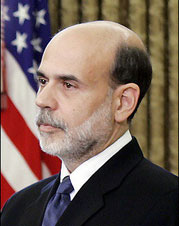|
 |
|
White House economic adviser Ben Bernanke stands
in the Oval Office of the White House in October
2005. |
Ben Bernanke, President George W. Bush's pick to
succeed the all-powerful Alan Greenspan as Federal Reserve chairman, will
appear before US senators Tuesday for a crucial confirmation hearing.
Bernanke will need to be confirmed by the Senate banking
committee, and then by the full Senate, before he can succeed the
79-year-old Greenspan, who is retiring on January 31 after 18 years at the
helm of the US central bank.
Bush nominated Bernanke, 51, for the position on
October 24 and unlike the president's nominees for the US Supreme Court,
the former Princeton University economist is expected to sail through
the confirmation process.
That said, Democrats are keen to probe the support
Bernanke has expressed for contentious White House economic policies
such as multi-billion-dollar tax cuts in his current guise
as head of Bush's
Council of Economic Advisers.
And the Senate committee's Republican chairman, Richard Shelby, has
promised a thorough hearing on a wide range of issues beyond the Fed's
normal territory of monetary policy and financial sector oversight.
"This will be a very involved hearing on both sides
of the aisle ,"
Shelby said on October 28 after a meeting with Bernanke.
Shelby's comment came after Bernanke, shortly before he was nominated
to the Fed job, appeared before the Joint Economic Committee of Congress
to defend the Bush economic agenda.
He called on the US legislature to make Bush's intensely controversial
tax cuts permanent and to slash government spending -- policy
prescriptions that failed to find favour with Democrats.
But since then, Bernanke has stressed that he was speaking in his role
as the president's top economic adviser.
He has won over Charles Schumer, a leading Senate Democrat who sits on
the banking committee, who on Thursday gave Bernanke enthusiastic backing
after the two held a meeting.
The New York senator said Bernanke would be an "an outstanding Fed
chairman ... in the mould of Alan Greenspan".
Schumer said he had received assurances from Bernanke that he would
follow Greenspan's lead in speaking out about fiscal policy and the need
to reduce deficits.
The senator said Bernanke had also assured him that he would be
flexible in his approach to monetary policy, after some critics raised
concerns about the Fed nominee's support for an explicit inflation target.
Greenspan opposes such a target, arguing it would unduly limit the
central bank's room for policy manoeuvre.
Paul Sarbanes, the senior Democrat on the Senate banking committee, has
expressed concern that Bernanke would focus only on inflation and pay too
little attention to the Fed's other main mandate to foster economic
growth.
But Bernanke has insisted that he would not be a slave to any target if
the economic conditions demand a more supple policy response.
Under Greenspan, the Fed has raised interest rates at each of its past
12 meetings to keep a lid on energy-fuelled inflationary pressures, after
taking them to historic lows after a 2001 recession.
(Agencies) | 